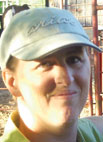 Autumn Gregg talks about her sheep showing career in terms beyond her 12 years. “I feel like my name’s gotten out there,” said Autumn confidently.
Autumn Gregg talks about her sheep showing career in terms beyond her 12 years. “I feel like my name’s gotten out there,” said Autumn confidently.
Autumn’s confidence built on extensive show experience in her young life. She began showing sheep when she was 5 years old, as a 4-H Clover Bud.
When she talks about her name getting out there, Autumn is referring to the reputation of her Suffolk-Hampshire crossbred market lambs. Now, she has added registered sheep to her flock of 15 crossbreds. She has four registered American Southdown ewes and one registered ram.
Autumn, a Farmington, Ark., middle school student, juggles showing hogs and sheep. Plus, she has school activities that include the gifted and talented program, band and softball.
Among the reasons for choosing the Southdowns are that their upkeep fits in nicely with her routine with the crossbreds.
That routine requires five to seven hours a week – 10 hours per week as show season approaches. It has also meant bottle-feeding lambs that are not cared for by moms for a variety of reasons. “They’re either a great mother or they’re not,” her dad Tracy Gregg said. Ewes have difficulty feeding triplets.
Autumn also checks on sick lambs and sheep and makes sure they are ready for the show ring. She does head-to-hoof checks before, during and after shows, and checks on her sheep every night to look for signs of health problems that can be headed off at the pass. She has seven lambs from five ewes this lambing season – two sets of twins and three singles. She is so dedicated to her sheep that she has been known to fall asleep in a living room chair with one in her lap.
Her experience showing sheep and hogs includes making the premium sale every year since she began showing at the Washington County Fair. She is going into her eighth show season with sheep and seventh with hogs. She has done well at the state fair, as well as jackpot fairs during the show season. “We may start to do more traveling,” said her father Tracy.
She has refined her showing skills through the years. For instance, she now understands that holding the sheep’s head instead of using a lead is better. She demonstrates how she turns her sheep in the ring so the judge can see them. She also understands that everybody has good days and bad days in the show ring and it is “ok” to not win them all, so congratulate the winner and look forward to the next time.
“I think it’s made me more responsible,” she said.
As she talks, it is easy to see how it has helped her as she grows into adulthood, talking with pride about her herd of sheep, plans to become a veterinarian and hopes to have a ranch one day – all realistic goals given her track record.







